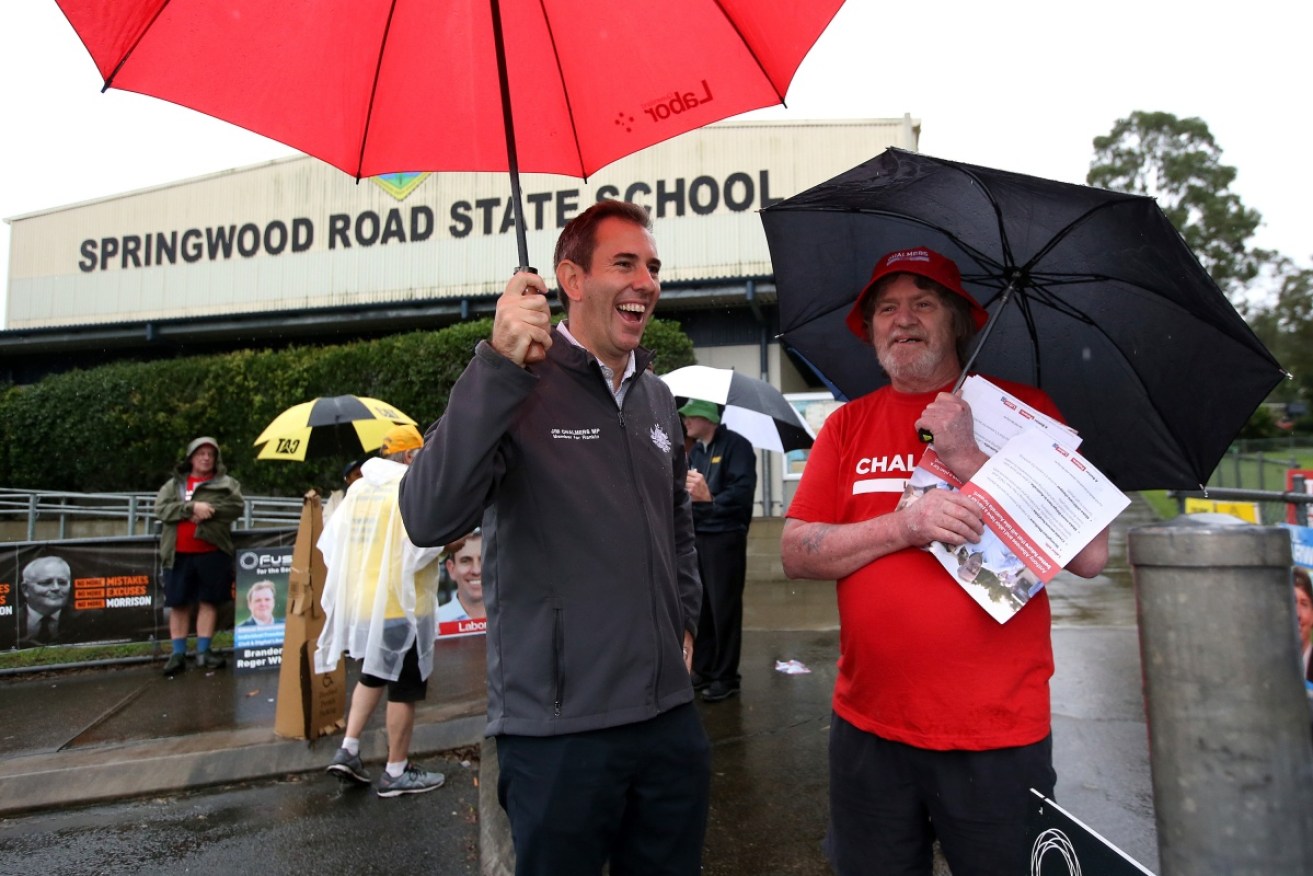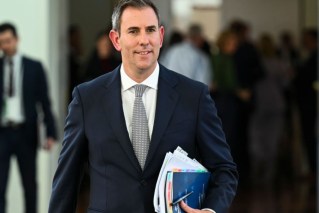As Jim Chalmers prepares for the challenges ahead, these loyalties will help sustain him


Behind the doctorate, drive and disarming drawl of Jim Chalmers lies a treasure chest of friendships, David Fagan writes. Photo: AAP
Behind the doctorate, drive and disarming drawl of Jim Chalmers lies a treasure chest of friendships collected through schooldays, university and political life.
They are united in a loyalty to the federal Treasurer – not an uncommon adornment for a politician on the rise, but polished by a warmth Dr Chalmers will need to attract more broadly as his honeymoon in government becomes a marriage defined by the conflicts that will go with battling inflation, reforming an inefficient tax system and cutting government spending.
His success will depend on many factors he can’t control – the global factors driving inflation, the most dangerous security environment in 70 years, the increased occurrence of natural disasters are the known unknowns. Then there are the unknown unknowns.
All of which seem threatening. But bear in mind that Dr Chalmers, a boy from Logan, a city with a heart but not a main street, wedged between Brisbane and the Gold Coast, is both academically smart and smart in building the loyalties that sustain him.
He always has been.
His first speech to Parliament, makes the usual and valuable acknowledgements – to his family and his wife and mother in particular, to his school friends Gaz, Pickle, Dimmy and Spud and to his “formative teacher” Norbert Greulich.

Jim Chalmers’ “formative teacher” Norbert Greulich. Photo: Supplied
Greulich, a wartime refugee, and third-generation teacher with children and grandchildren who have followed him, was near retiring age when he taught history to a young Chalmers at Brisbane’s Clairvaux MacKillop College. He still hears from his one-time student.
And he keeps with pride a copy of the honours thesis Dr Chalmers wrote when finishing his first degree at Brisbane’s Griffith University in 1998.
“Teacher, role model and dear friend,” wrote 21-year-old Jim Chalmers.
“This piece of work is an extension of all that you have taught me about history and, more importantly, about what it takes to dedicate yourself to a goal and achieve it. You have always believed in me even when I’ve found it difficult to believe in myself. This work is very much a product of your faith in me. On every page of this thesis, your mark can be found. I hope that this makes you proud. ‘A teacher affects eternity; he can never tell where his influence stops’ (Henry Adams). You have influenced me in every positive way.”
Lovers of education know the value of transformational teachers who, occasionally become the star attraction of blockbuster films – think To Sir With Love, Good Morning Mr Chips or Mr Holland’s Opus.
Dr Chalmers is Mr Greulich’s opus.
“He wasn’t troublesome but he didn’t stand out either,” Mr Greulich recalls. “One day I set an assignment and I said, ‘Jim can you do me a favour? For once, try your best, let’s see what you come up with’. And he came back and got an A+.
“I said ‘now we know what you can do, don’t give me anything less in the future’. The best thing was that challenge made him perform really well in all the other subjects. So he came out as a top student in the end from a very average start.”
Jim Chalmers left school, learning to believe in himself.

Dr Chalmers’ honours thesis from his first degree at Griffith University in 1998. Photo: Supplied
Former Queensland Labor state secretary, now ministerial colleague, Senator Anthony Chisholm, was one of his colleagues at Griffith University, conveniently close to home.
“We met on our first day at Griffith in 1996. I was already a party member. Jim wasn’t but we soon corrected that.”
Dr Chalmers attributes his decision to join the Labor Party to ALP’s loss of federal power in the year he started university. Its then leader, Paul Keating, was later to be the subject of his doctoral thesis at Australian National University.
While Senator Chisholm recalls more focus on the fun part of university life and the fortunes of the Brisbane Broncos than the study, he refers to an ongoing passion for redressing inequality.
“Growing up in an environment that wasn’t wealthy and understanding the sacrifices his family made motivate him to use his experience to advocate for people like him, to give them the chance they deserve.”
Former Queensland treasurer, now chancellor of Griffith University and chair of the Australian Retirement Trust, Andrew Fraser, dates his connection with Dr Chalmers to the same period.
“We were both fans of Paul Keating and the Broncos, which is a pretty good start,” says Mr Fraser (who includes a board seat at the Broncos among his extensive business portfolio).
The two cemented their association when Dr Chalmers was researching his PhD at ANU and Mr Fraser was working in Canberra. Their regular meeting place was the All Bar Nun in Canberra’s O’Connor, where they would talk football and ambitions for the country they believed were being suppressed post-Keating.
“I grew up in Proserpine (north Queensland) and Jim grew up in Logan. There’s 1100 kilometres difference but not a huge difference in our experiences, in how we saw inequity of opportunity and reasons for government to provide it.”
Chalmers’ former boss and former federal treasurer Wayne Swan credits him with never straying too far from “struggletown”.
“He’s driven very much by the experience of growing up in a disadvantaged area, getting a degree and coming back and living there. He still has the same circle of friends he knocked around with at school but he’s also a policy junkie, hungry for ideas.”

Former Treasurer Wayne Swan has praised his ex employee’s experience. Photo: AAP
Dr Chalmers was Mr Swan’s chief of staff in government, a period in which Australia successfully navigated the global financial crisis.
“He has more experience in going into the treasury portfolio than either Keating or I had.”
Former federal minister Jenny Macklin first encountered Dr Chalmers when he was a researcher for the ALP and preparing for his doctorate in the early 2000s: “I remember him coming to parliament and thinking, this is a guy who will be a great contributor,” she says.
Later in government, Ms Macklin got to know him more closely while he was running Mr Swan’s office.
“One thing I love about him is his enormous affection for where he has come from, the way he talks about his mother, the love for his local people and the love for his family.”
Among the mentors and acquaintances Dr Chalmers has maintained is the nation’s most senior public servant and one of its most prominent public intellectuals, Professor Glyn Davis.
Professor Davis was head of the politics and policy department of Griffith when Dr Chalmers enrolled in 1996. He was later director-general of the Queensland Cabinet Office (where Dr Chalmers also worked), then vice-chancellor of Griffith and vice-chancellor of Melbourne University. He has been secretary of the Department of Prime Minister and Cabinet since June.
Like the former teacher, Norbert Greulich, Professor Davis has stayed in touch with Dr Chalmers in the decades since he arrived at the Griffith campus as a 17-year-old (as Queensland graduates then were).
“This is not an unusual thing. It’s what academics and students keen to continue their development do. It’s been a happy and continuous link.”
Professor Davis describes their ongoing dialogue as more about policies and ideas than personal interests, a description that tallies with his recollection of a young Chalmers who was part of an engaged public policy coterie at his old university – not just Dr Chalmers, Senator Chisholm and Mr Fraser but also former Liberal minister Gary Hardgrave.
Beneath all this is the requisite level of political knowhow that circumstances might favour, a trait Mr Swan points out is essential to success. Dr Chalmers chose not to run for the Labor leadership after the 2019 election loss, leaving a clear pathway for Anthony Albanese.
And his wedding to journalist Laura Chalmers (previously Anderson) is part of ALP folklore, coming in the midst of a leadership tussle where calls were being made and numbers were being tallied in a side room to the main reception in a Byron Bay reception centre.
The marriage has yielded three children, two of whom became part of a photo shoot when The Australian Financial Review produced its annual power list and asked the nation’s second most powerful person to bring something important to him.
Others took physical objects; Dr Chalmers took two of his children (although only one made it to final publication).
As Dr Chalmers prepares to deliver and sell his first budget, his former school teacher has some regrets for him, noting the complex issues he has to balance and the demands of politics.
“He is an achiever but looking and watching him, I worry about him and that hopefully he is smart enough to also say if the time comes, I think for the sake of my life and my family I have done enough, I have to do something else because politics is not an easy thing.”
But then Mr Greulich reconsiders, recalling his former student’s relish of a challenge.
“I could see him at the top and he would be good. He would do it right. He’s got the experience, he’s got the knowledge and is totally prepared and qualified for this job.”
In Norbert Greulich’s view: A+ material.
- David Fagan is a veteran journalist and former newspaper editor who has been covering budgets since John Howard was treasurer.








